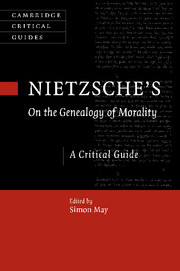Book contents
- Frontmatter
- Contents
- Contributors
- Acknowledgements
- Note on texts, translations, and references
- Introduction
- Chapter 1 The future of evil
- Chapter 2 On the nobility of Nietzsche’s priests
- Chapter 3 The genealogy of guilt
- Chapter 4 Why Nietzsche is still in the morality game
- Chapter 5 Who is the “sovereign individual”? Nietzsche on freedom
- Chapter 6 Ressentiment and morality
- Chapter 7 The role of life in the Genealogy
- Chapter 8 The relevance of history for moral philosophy
- Chapter 9 Why would master morality surrender its power?
- Chapter 10 “Genealogy” and the Genealogy
- Chapter 11 The promising animal
- Chapter 12 Nietzsche and the “aesthetics of character”
- Chapter 13 Nietzsche and the virtues of mature egoism
- Chapter 14 Une promesse de bonheur? Beauty in the Genealogy
- Bibliography
- Index
Chapter 12 - Nietzsche and the “aesthetics of character”
Published online by Cambridge University Press: 05 November 2011
- Frontmatter
- Contents
- Contributors
- Acknowledgements
- Note on texts, translations, and references
- Introduction
- Chapter 1 The future of evil
- Chapter 2 On the nobility of Nietzsche’s priests
- Chapter 3 The genealogy of guilt
- Chapter 4 Why Nietzsche is still in the morality game
- Chapter 5 Who is the “sovereign individual”? Nietzsche on freedom
- Chapter 6 Ressentiment and morality
- Chapter 7 The role of life in the Genealogy
- Chapter 8 The relevance of history for moral philosophy
- Chapter 9 Why would master morality surrender its power?
- Chapter 10 “Genealogy” and the Genealogy
- Chapter 11 The promising animal
- Chapter 12 Nietzsche and the “aesthetics of character”
- Chapter 13 Nietzsche and the virtues of mature egoism
- Chapter 14 Une promesse de bonheur? Beauty in the Genealogy
- Bibliography
- Index
Summary
On the Genealogy of Morality calls for a “critique of moral values” (GM, Preface, 6), a critique which has no ambition to be value-neutral: “the value of these values should itself . . . be examined.” At least if the object of the critique is morality as a whole, the values invoked cannot themselves be moral, on pain of making the critique self-defeating. So the question arises what these values – in particular, what Nietzsche’s ideals of and for humanity – might be. It has been proposed, citing evidence as much from the Genealogy as elsewhere, that the values in question are “aesthetic” (Foot 2002a: 147). Indeed Nietzsche’s ethical thought seems to act as a kind of flypaper to the word “aesthetic,” which sticks to it in a variety of more and less appropriate meanings. However, given the availability of the distinction between the moral and the ethical, which marks out morality – in ways indebted of course to Nietzsche himself – as a “particular development of the ethical” (Williams 1985: 6), we do not need the term “aesthetic” in order to label a set of ideals simply insofar as they do not belong to morality: if the “aesthetic” label is to justify itself, it needs to do more work than that. And to understand what work it is capable of doing, we need to understand better what it is for an ideal – an ideal of character or of human living, that is, rather than an ideal of the appearance of art objects – to be aesthetic. The aim of this chapter is to do that, with a view to establishing that, tempting as it is to reach for the phrase “aesthetic” in connection with Nietzsche, it is poorly motivated as a description of what is distinctive about his ideals of character.
The direction I shall take is as follows. First I suggest that “(merely) aesthetic” is the way any non-moral ideal of character might be expected to look from within the perspective of morality, narrowly understood (section 1). But since we can’t understand anything about Nietzsche’s ideals of character without including his critique of morality in the story, if we want to describe how Nietzsche saw his own ideals of character, we will have every reason not to describe them as aesthetic in this sense. And, to the extent that we are ourselves impressed by Nietzsche’s critique of morality, we will also have reason not to describe ideals of character as aesthetic in this sense in propria voce.
- Type
- Chapter
- Information
- Nietzsche's On the Genealogy of MoralityA Critical Guide, pp. 265 - 284Publisher: Cambridge University PressPrint publication year: 2011
- 2
- Cited by

